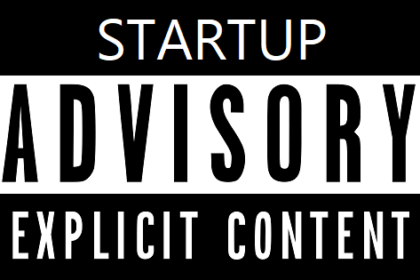
Advice about startups is prolific as grains of sand on a beach. Heck, here I am, sharing advice and implying I have the answers. In truth though, classically trained and experienced as a marketer, I hope I also convey more than most that there are no answers, only insight, opportunity, experience, and potential. Everyone wants to be seen as an expert and inexplicably, one success is often all it takes for someone to be perceived as a startup guru. Yet success is rarely replicable, no? At best, someone strikes lightning in a bottle once and thus, any advice, even Bill Gates’, needs to be taken with a healthy grain of salt.
Still, advice is invaluable (and feedback perhaps more so) and over the years, and in working with at least two handfuls of startups, it’s become clear that there is consistency in the highest level advice given. More so, it has become clear that there is a distinction between the advice given by Founder/CEOs and Executives.
Startup Advice from Founders vs. Advice from Executives
I’ve explored this idea a bit before and it’s only recently that I’ve started to appreciate it more. Executives are perhaps called so because they execute and thus they’re your pool of experienced developers, marketers, sales professionals, and financial professionals to whom you should turn for such advice. On the other hand, former and current CEOs have figured out how to build teams, raise capital, inspire ideas, and consider the big picture but think about it, from whom would you rather have advice about Marketing? A successful CEO or a VP Marketing from a company in your field?
My intention is not to pick on CEO advisors; it’s only to get you to consider the distinction and the role of mentors and advisors in your success. It might be worth balancing your pool such that as a startup founder, you have CEO mentors while your Board of Advisors is comprised primarily of the Executives who can advise you as to how to execute the tactics behind your vision.
With that in mind, rather than a collection of advice from successful startup founders, I’ve been collecting thoughts from startup executives. And with an ear toward that idea of replicability, that it’s unlikely that a startup founder has figured out how to repeat success, it’s not unlikely that the executives who prefer working for startups than starting them, hit it out of the park time and again. Good executive advice, from serial executives, might be the key to what really works.
Startup Advice from Serial Startup Executives
- To succeed, first learn how to run a business. Success through pitching, traction, validation, and the typical tenets of startup success will fail you if you drop the ball on the basics and there is no excuse for not learning the basics from a good incubator or advisor.
- Don’t be short-sighted. Your next customer or client is only as good as that deal. Know how and where you’re scaling in 1 year, 5 years, and beyond.
- Be ready (and quick) to adapt. You will fail, appreciate the lesson and adapt. You will be wrong, appreciate and course correct. You will discover competitors along the way, figure out how to stay ahead of them.
- If an incubator, advisor, employee is failing you, drop them fast. By the same token, do everything you can to hire great people, engage great advisors, and benefit from great programs. Never miss the opportunity to get a great professional on your team, figure out their role later; compensation is not the only tool at your disposal
- Don’t spend more cash than you can afford to spend and keep in mind that equity in a valuable business is worth more than money. Learn how to trade in both as your cash is the only thing that will keep you afloat.
- If you’re going to spend on advertising, make sure the ROI is good. How do make sure the ROI is good? Invest in marketing.
- Never stop marketing.
- Always give value first.
- Do not raise capital for inventory, to pay yourselves, or to pay for sales. Your success drives those channels. Capital is for development, production, and marketing.
- Do your home work.
- No idea is new. Never say you have a new idea and NEVER expect people to sign an NDA. If you convey that someone else can out execute your idea by stealing it, they probably can.
- Make sure your margins are right and your cash flow is in good shape.
- Taking on an existing market with a disruptive idea is a Market / Product fit. Taking on a new market with an existing but improved product is a Product / Market fit.
- Paper everything (but NDAs). Learn what a pre-nup in business is and have one.
- Tactical advice from investors, angels, and advisors is usually wrong. Never trust that you’re budgeting too much/too little, need to do social media, need to focus on sales, should hire an X.
- Learn how to appreciate advice from investors, angels, and advisors for what it’s worth… they’re your partners, not customers so work with them to figure out what’s right and be capable and confident enough to tell them when they’re wrong.
- Work in your business and on your business. It’s not the same thing.
- Lead and get out of the way. The job of a CEO/Founder is resources & strategy. Build the team that executes.
- Make sure you are in it for 5-7 years — and that you are prepared for the 2 years it takes to get anywhere.
- Great products rarely sell themselves. But keep in mind, Sales isn’t scalable; Sales closes. Marketing drives demand.
- EVERYONE on your team needs to know the pitch six ways to Sunday. Pitch perfect, consistently, and on demand.
- Give equity. Have equity agreements. Appreciate that they never NEED to be 4 years with a 1 year cliff. Think about what that means.
- Operate with the highest degree of integrity and work within an ethical framework. Business is personal. You can piss people off, you can disagree, you can criticize, but remember, it is personal. Consider that we’re all in this together, even if we’re apart.
- Never lose a customer
- Build the infrastructure capable of growth: team, technology, marketing







Good points
Nice article, Paul. Well said.
Excellent Paul! I’m going to keep these handy for me and my team!
Great stuff as always Paul. I’m a curator for quuu.co and I just submitted it there (and growthhackers.com), to help spread the word.
Good advice but left out one of the most important elements IMO for real success: business development. Definitely not the same as sales which are short-sighted.
This should be a poster or mural at many startups.
Very good advice – right across the harsh terrain of ‘starting something’ to grow it. Would only add (right up front) – ensure that your own psychology & mindset is firmly aligned to what it will need to be, and become, to implement all of Paul’s good advice.
Some solid advice for a seasoned pro! Well worth a bookmark for those in #Startup land. Well written Paul O’Brien
Great post! Thanks for sharing.